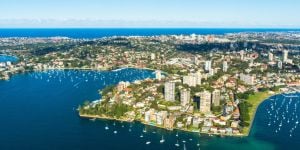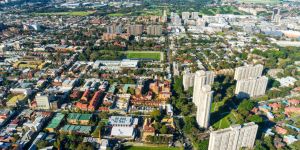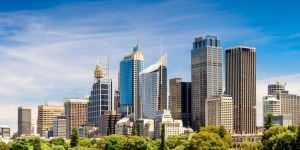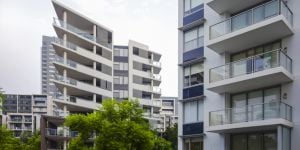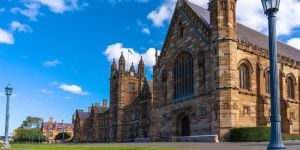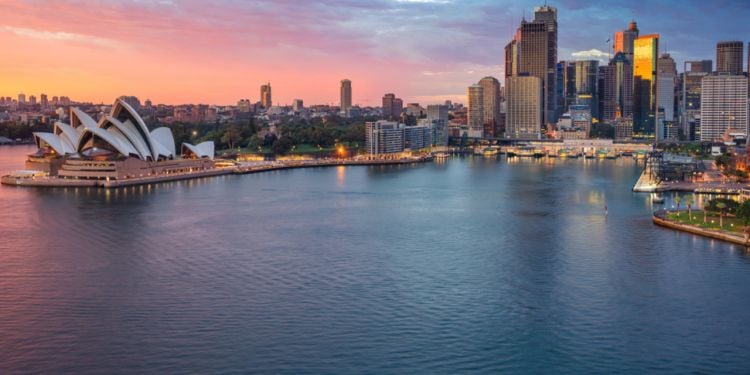
Accommodation in Sydney can be very expensive, both for renters and buyers alike. Known for being one of the most beautiful cities in the world, Sydney is also ranked near the top when it comes to expenses. According to the latest Economist Intelligence Unit report, Sydney is now ranked equally with Copenhagen at number 10 in the rankings of the most expensive in the world. This is due to accommodation costs, as well as the rising price of groceries, transport, and everyday services.
However, if you're determined to live in Sydney, you can usually find something that works for you if you're willing to put the hard work into finding it. However, be aware that compromise may be required, especially if you're used to living somewhere where there's less competition for accommodation or a different rental system.
Sydney's neighborhoods
Sydney is the biggest city in Australia. Built around the famous Sydney harbor, extending inland to the Blue Mountains, and spreading out along a beautiful coastline, Sydney is a city with a huge variety of neighborhoods, from family-friendly suburban areas to high-end coastal spots. We recommend doing your research and paying attention to public transport and amenities when figuring out where you want to live.
Bondi Beach
Bondi Beach is a famous coastal neighborhood renowned for its stunning surf beach and laid-back lifestyle. It offers a cool mix of beach culture, trendy cafes, and buzzing bars. A highly desirable area, living expenses and property prices in Bondi Beach are definitely on the higher side.
Surry Hills
Surry Hills is an inner-city neighborhood full of trendy cafes, hipster bars, and unique boutiques. The area has experienced gentrification in recent years, resulting in soaring property prices. While it offers a fantastic location close to the city, be prepared for higher living costs.
Newtown
Newtown is a vibrant and eclectic neighborhood known for its bohemian atmosphere. It attracts artists, students, and creative types. Newtown offers a slightly more affordable option compared to some other central areas, making it a popular choice for artists, students, and young professionals in creative industries.
Manly
Manly is a picturesque coastal suburb that offers a relaxed beachside lifestyle. With its beautiful beaches, beachfront cafes, and bustling Corso filled with shops and eateries, Manly has a charming and laid-back vibe. Although property prices can be higher closer to the beach, there are more affordable options in the surrounding areas.
Darlinghurst
Darlinghurst is a bustling neighborhood with vibrant nightlife, live music venues, and a thriving LGBTQ scene. It offers an array of dining options, from trendy restaurants to cozy cafes. While it provides a central location and a lively atmosphere, living costs and property prices can be relatively high in this area.
The above neighborhoods tend to be the most well-known areas, which have a particular reputation or “vibe.” Because of this, they tend to be more expensive to live in and more competitive when hunting for a place to live. If you aren't interested in living in an area connected to a specific scene or lifestyle and you are simply focused on affordability, then it makes sense to consider suburbs further out from the city with lower housing costs. Sydney offers several suburbs that are generally considered more affordable. These include Blacktown, Mount Druitt, Liverpool, Bankstown, and Penrith. These suburbs provide a range of accommodation options at relatively lower prices compared to the city center and other expensive areas.
Flat sharing in Sydney
If you are looking to save money and live in a social situation, it makes sense to move into an already established household or “flat.” Whether you're a backpacker, a student, or simply seeking a more sociable living environment, flat sharing in Sydney allows you to split the rent and expenses with one or more people.
The conditions for flat sharing in Sydney can vary, offering both short-term and long-term options and flexibility in terms of the number of roommates you can have. One of the perks of flat sharing is that it's a less formal process, usually bypassing the need for references or long queues for property inspections. Instead, decisions are usually made by the current occupants, giving you the opportunity to get a real sense of the expectations and personalities of your potential housemates. To find the perfect flat share in Sydney, check out popular websites like Flatmate and Gumtree, where you can browse through listings and connect with like-minded individuals in search of flatmates. Often, if you go to a flat for a viewing, you will have an informal interview with current flatmates to see if you will fit in with them.
The Sydney rental market
In 2023, Sydney took the crown for the biggest rent increases in Australia, with prices jumping a whopping 14%. There's no denying that renting accommodation is expensive and house-hunting in Sydney is highly competitive. We've collected a few tips so that you go into the market prepared.
The first thing you want to do is research and get a sense of the market. Head online and check out websites like Realestate.com.au, Domain.com.au, Rent.com.au, Homely.com.au, Gumtree.com.au and Raywhite.com. As well as trusty Google, there's also more to flat hunting than just online searching. Word of mouth can be an excellent tool to find a place, especially if you are just after a single room or a short-term stay. Spread the word among friends, post what you're looking for on Facebook groups, or keep an eye on notice boards. You never know; you might stumble upon a hidden gem without dealing with the hassle of competitive viewings.
However, like it or not, most people use public viewings to find a place. We recommend attaching a short cover letter to your application if you are regularly attending viewings. It doesn't need to be an essay, just a quick intro about yourself and what you do – basically, take any chance to stand out from the pack.
Paying rent and renters' obligations in Sydney
When it comes to paying rent in Australia, you will either be paying weekly, bi-weekly, or monthly. The payment is usually made via an automatic payment you set up using online biking. When you sign your lease in Sydney, you will generally pay one month's rent and a security deposit (bond) upfront. You'll get that bond back when you're ready to move on, so long as there is no damage to the property. There are several different types of residential tenancy agreements, including short-term fixed, long-term fixed and periodic leases. Your landlord may only offer a specific kind of lease, or they may be open to negotiation.
Flats in Sydney can come fully furnished, but many are unfurnished. Don't forget to check if appliances like washing machines, dryers, and fridges are included. And if you're an animal lover, double-check if pets are allowed. Sadly, many landlords in Australia aren't too keen on pets.
Keep in mind that water costs usually are generally covered by landlords, but you'll be responsible for electricity, gas, and internet/cable.
If there's anything you're unsure of, or if something strikes you as unfair, you can reach out to the RBTA (that's the Residential Tenancies Bond Authority). They're the authority for landlords and renters and can help with disputes. Another source of advice is Consumer Affairs. They can advise you about rental rules and your rights as a tenant.
Short-term rental options in Sydney
When it comes to seeking short-term rental options in Sydney, you'll find there are quite a few options available to you – if you know where to direct your search. Going for a short-term stay can prove to be a great solution for individuals who are looking for something flexible.
Firstly, Airbnb can be a promising choice. Often hosts are amenable to month-long stays, even if they haven't explicitly mentioned it in their listings. We recommended proactively approaching such hosts, proposing the notion of an extended stay. This affords greater flexibility compared to traditional short-term rentals, and some hosts will jump at the chance to avoid the hassle of change-overs, cleaning, and dealing with communication from multiple guests.
House swapping involves exchanging homes with another individual for a predetermined duration, allowing you to discover a new place while enjoying the comforts of a home away from home. Platforms such as HomeExchange and Love Home Swap serve as facilitators for house swaps, connecting homeowners in Sydney who express an interest in mutually beneficial home exchanges. Obviously, to be successful at this, you've got to have a pretty desirable home in another location.
Lastly, subletting is a viable choice. Prominent online platforms such as Gumtree, Craigslist, and Facebook groups are all good channels for securing sublet arrangements. By tapping into these platforms, you can discover all kinds of options, from house-sitting to tiny houses.
Student accommodation in Sydney
Sydney is home to several prestigious universities that attract a diverse community of international students. Whether you're enrolled at the University of Sydney, the University of New South Wales, Macquarie University, the University of Technology Sydney, Western Sydney University or the Australian Catholic University, you'll be able to select from a range of choices.
One popular choice for international students is on-campus accommodation, which is available at most universities in Sydney. When enrolling as an international student, seek advice about housing from international student advisers. Student dormitories or residential colleges are a common choice for international students in Sydney, as they're convenient and provide easy access to campus. However, prices can be more expensive than independent living (although benefits like meals and facilities can balance this out).
For those seeking a more independent living experience, off-campus options are also available. Shared houses and apartments are a common choice among students who prefer to live with fellow students and share the cost of rent and bills. To find a flat in Sydney, visit Gumtree, Flatmate Finders, or look on Facebook groups. Homestays are another alternative that allows students to live with local families, offering a firsthand experience of Australian culture.
When considering student accommodation in Sydney, it's important to consider budgeting. Alongside rental costs, students should consider other expenses such as groceries, utilities, and transportation. Some accommodation options may involve sharing groceries and include some expenses in the rental price, while others may require separate payments. Again, always consult with your university's international student advisor for guidance on budgeting and understanding the overall cost of living in Sydney so you don't end up living beyond your means.
Buying property in Sydney
According to property data analysts, the housing price downturn in Australia has come to an end, with the market reaching its bottom and beginning to slowly rise again. The anticipated return of overseas migrants to the city post-Covid-19 is expected to give a boost to prices and revitalize the market as the year progresses. Data from April 2023 places the median house price in Sydney at AUD 1,253,759, while the median unit price will be approximately AUD 787,427. Yes, you read those figures right! The property prices in Sydney are famously high, and many expats start off as renters. However, if you're looking to invest, 2023 may present a potentially opportune moment to consider buying property, taking advantage of the current dip in prices, and anticipating future growth.
One thing to be aware of is that if you are considering purchasing a house or apartment in Sydney and you are not a permanent resident of Australia, restrictions may apply to what you can legally purchase. Temporary residents are generally allowed to purchase one property for their sole residential use but are not permitted to buy investment properties. However, it's worth noting that the specific regulations may vary depending on your visa type. Once you obtain permanent residency, you have much more flexibility when it comes to investment properties. For more detailed information on the regulations surrounding real estate purchases, please visit the website of the Foreign Investment Review Board.
We do our best to provide accurate and up to date information. However, if you have noticed any inaccuracies in this article, please let us know in the comments section below.
